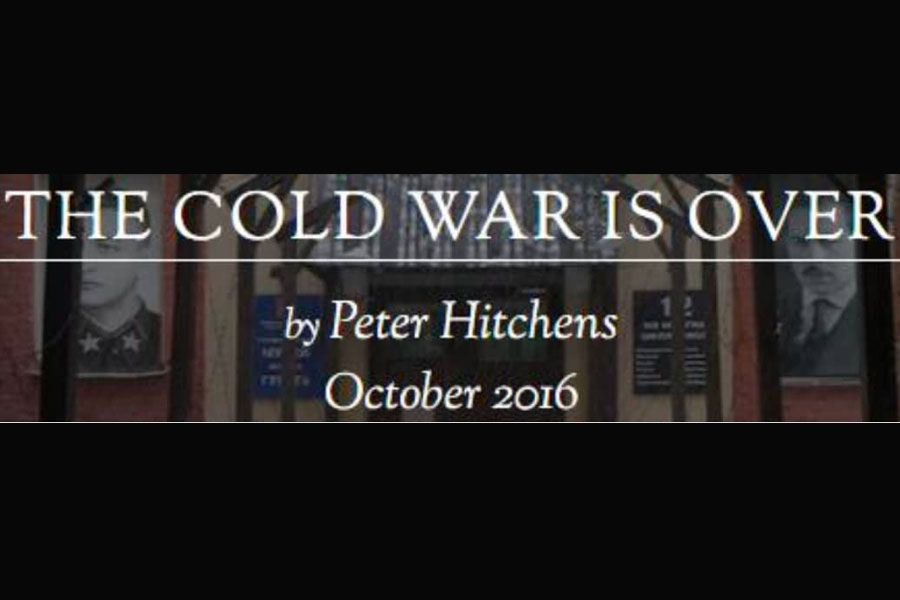Letter To The Editor
by Dan Negrea
The Washington Times
Letter to the Editor by Dan Negrea in response to Peter Hitchens’ article
I grew up in Communist Romania and visited Russia last month, so I read with great interest Peter Hitchens’s article “The Cold War is Over.” The article is, to paraphrase the late Senator Daniel Patrick Moynihan, a hodgepodge of fine feeling and bad history.
I join the author in feeling good about the fall of the monstrous Communist dictatorship that was the USSR. Regarding what replaced it, though, I found a more accurate image in Nothing is True and Everything is Possible, the recent book by a British author of Russian origin, Peter Pomerantsev. To quote from the book’s review in the New York Times, in Russia “‘reality’ is scripted by the dark forces inside the Kremlin. Fake opposition parties engage in fake opposition to those who rule, a fake justice system goes through the motions of the legal process, and the fake television news shapes what Russia’s 143 million citizens are allowed to see.” There are just three national TV stations and all three are controlled by the Kremlin. Opposition politicians and journalists are frequently murdered. The economic system is one vast kleptocracy: A chosen few amassed fast riches by looting assets from the collapsed USSR economy. However, these oligarchs keep their wealth at the pleasure of the Kremlin and when they displease the Kremlin they are dispossessed, forced into exile, imprisoned, or killed.
I also join the author in his warm feelings for the reopening of Orthodox churches and monasteries closed under the Communists or converted into museums of atheism. Regretfully, though, the Russian Orthodox Church remains (as always) a servile supporter of the government’s nationalist objectives. In exchange for uncritical support, the Russian Orthodox Church gets a quasi-monopoly on religion, enforced by the Kremlin. In a July 2016 law aimed mainly at fast-growing Protestant denominations, it became illegal to share one’s faith outside government-approved buildings. In Russia it is now illegal, for example, to email friends to invite them to a religious service or to host a prayer meeting in your home.
The most confusing part of the article regards Russia’s foreign affairs. I will limit my criticism to two points.
First, the author justifies the expansion into neighboring territories controlled by neighboring sovereign states (Georgia, Ukraine, and Moldova) by pointing out that this “supposed aggression” occurred in “zones that Moscow once controlled.” The author praises the “unprecedented peaceful withdrawal” of Russia from 700,000 square miles of territory. Well, I don’t know the exact square mileage of the modern colonial empire of Britain, but India alone was 1.3 million square miles, and after World War II, the British withdrew peacefully. Imperial powers don’t “abandon control”—they are pushed out. Once this happens, the former colonial power has no right to intervene in a former colony.
Second, he dismisses the occupation of the Crimean Peninsula as “a limited and minor action in the context of this conquered and reconquered stretch of soil, the ugly but unexceptional act of a regional power.” Does our British author remember the siren song of appeasement, when Neville Chamberlain felt that Hitler surely would be satisfied once he got Czechoslovakia? Putin has made no secret that he wants the Baltic republics, as well as some of the natural-resource-rich Central Asian republics in which he foments unrest.
Communism in Eastern Europe was imposed by Soviet tanks at the end of World War II and preserved by Soviet tanks afterward. When the USSR collapsed, Eastern Europe chose capitalism and democracy. Communism proved to be for them the longest and most painful road from capitalism to capitalism (and democracy). Not for Russia. Uniquely, Russia moved from Communism to authoritarianism at home and irredentism abroad. Today’s Russia threatens its neighbors and chooses to ally itself with all the bad actors on the international scene: Iran, Syria, and China. The author is right that the Cold War with the old Soviet Union is over because the old USSR collapsed. But the new Russia became a new threat.
Dan Negrea
NEW YORK, NEW YORK




